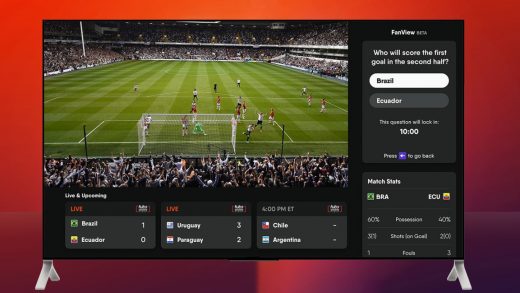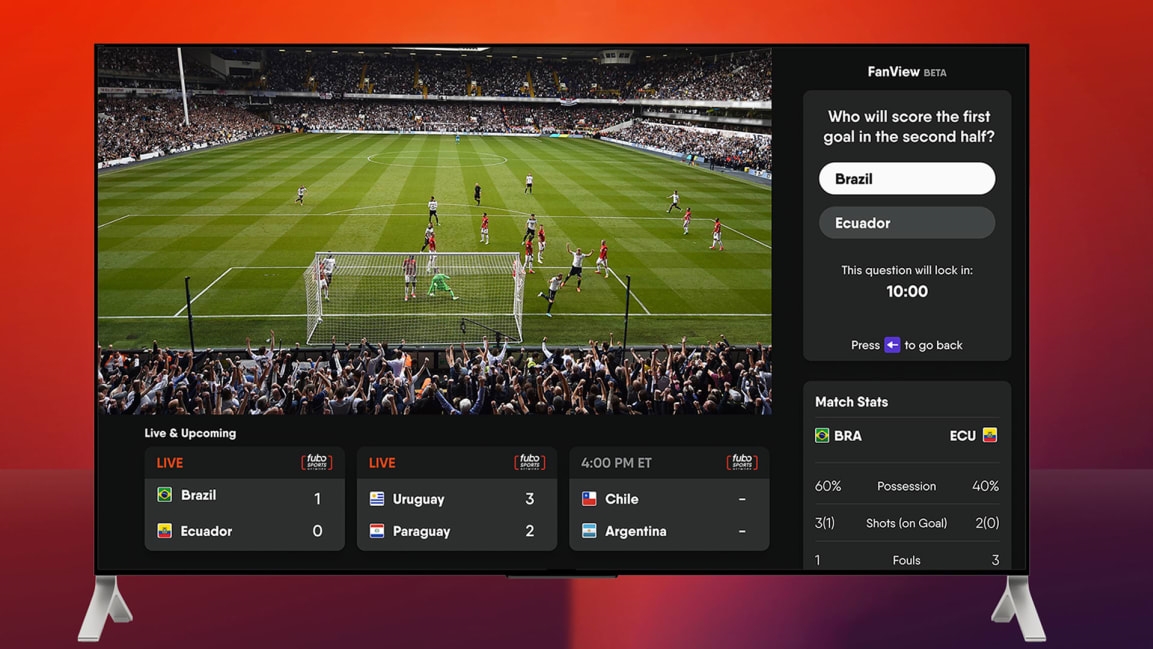Would you bet on sports through your TV? FuboTV is trying to find out
FuboTV subscribers might notice something new this week when they tune into the service’s South American World Cup qualifier coverage.
Inside FuboTV’s Roku and Android apps, viewers will be able to pull up a dashboard of live stats by scrolling up on the video stream. From there, they’ll get to answer a handful of quiz questions—for instance, “which team will score first in the second half?”—for a chance to win a free year of Fubo’s service, which normally costs $65 per month.
This may seem gimmicky, but Fubo says it’s part of a bigger plan to let people bet on games through their televisions. Fubo plans to launch a sportsbook in the fourth quarter of this year, but by starting with something a little lighter, Fubo is hoping to figure out how much interaction people want from their TV screens and which users would be inclined to bet real money as well.
“Our hypothesis is that it’s going to be an engagement driver, but also in the bigger picture, it’s kind of our first step towards our overall gaming strategy,” says Mike Berkley, FuboTV’s chief product officer.
FuboTV is one of many companies in the TV business that sees gambling as a potential cash cow, especially as the rising cost of sports and a declining pay-TV audience threatens the traditional channel bundle business. Still, betting on games remains illegal in many states, and Fubo is a fairly small streaming service. Its only choice right now is to move slowly as it builds its audience and pushes for more legalized sports betting.
More contests to come
For now, FuboTV’s live stats and contests are beta features limited to the Confederación Sudamericana de Fútbol (CONMEBOL) qualifiers, to which Fubo has the exclusive streaming rights. And while the live stats will also be available on Fire TV devices in the coming days, the contests will only appear on Roku players and Android mobile devices to start.
But Fubo plans to expand on both fronts over time. Contest support is coming soon to Fire TV, Android TV, iOS, and the web, and Fubo is aiming to bring contests out of beta in time for football season in the fall. The service could eventually add contests for other types of content beyond sports as well.
“Think of this really as a platform feature, where we can create a more enhanced viewing experience for every kind of content we provide on the platform,” he says.
David Gandler, FuboTV’s cofounder and CEO, also floats the idea of using contests as an advertising tool, with companies offering a chance to win a car or free pizza. It will also collect data on which viewers are most interested in contests, hoping to turn them on to betting once Fubo’s sportsbook launches.
“It allows us to isolate folks that are competitive and interested in additional opportunities,” Gandler says. “Some people will probably prefer to have more skin in the game than just the contests.”
Fubo hasn’t gotten into much detail on how its sportsbook would work, but the company insists that being able to control the entire experience is essential. By combining data from both the streaming and betting sides, Fubo believes it can more closely intertwine the acts of watching and gambling on live games.
“Acting on video is going to impact what bets are made available to you,” Berkley says. “What bets you’re making are going to impact what’s recommended to you on the video side.”
Gandler gives some examples: A viewer who only tends to bet on hockey games in the third period might see a recommendation to tune in after the first two periods are over. Or, a viewer who likes to bet on field goals in football might be able to flip between games where teams are in the red zone.
“This is going to be very fluid, and very immersive,” he says.
Obstacles remain
FuboTV isn’t alone in its zeal to boost TV revenues through gambling. In March, Dish Network added a DraftKings app to its satellite TV boxes, letting users watch and bet on games at the same time. Sinclair recently sold the naming rights of its regional sports networks to Bally’s hotels and casinos, and plans to offer a standalone streaming service for those channels with a betting component next year. NBCUniversal launched a betting companion show to the PGA Tour on Peacock in February, and Disney has started hinting at a betting component for ESPN+.
Still, FuboTV has a couple of major roadblocks in its way.
The biggest is regulatory approval to run its own sportsbook. For now, Fubo has only confirmed plans to launch in three states—Iowa, Indiana, and New Jersey—but doesn’t yet have approval to operate in any of them. Even sports betting giant DraftKings only operates in 11 states, and half of U.S. states haven’t legalized sports betting at all, according to the American Gaming Association.
Gandler is optimistic, saying the main obstacle is working with regulators to decide where the guardrails should be. “I believe that the job of the regulator is to protect consumers,” he says. “Their job is not to block you from developing a product.”
Even if support for online sports betting becomes more widespread, Fubo has a more fundamental challenge: It’s operating an expensive live TV bundle at a time when more customers are leaving bundles behind in favor of cheaper standalone services. While FuboTV is growing—the company gained 42,550 subscribers last quarter, bringing its total to 590,430—pay TV subscriptions as a whole dropped by 1.4 million last quarter.
Those trends may explain why so many companies are eager to offer sports betting in the first place: It could be a way for them to offset the ever-increasing costs of carrying live sports. Companies like Sinclair, for instance, might be more inclined to offer regional sports channels outside of pay TV bundles if it can boost profits through betting. FuboTV, meanwhile, might be able to make its live TV service more affordable.
“If things are going well, and we’ve added an additional revenue stream, we’ll look to balance that out,” Gandler says. “Given the fact that sports betting is profitable—it has a margin of, we believe, targeting around 50%—it’d be in our interest to see what we can do to [bring in] more people.”
In other words, watching live sports might still be an expensive endeavor, but only if you’re betting against the house.
(64)



